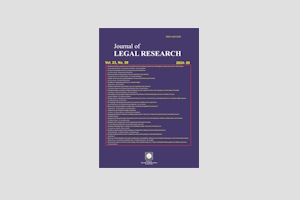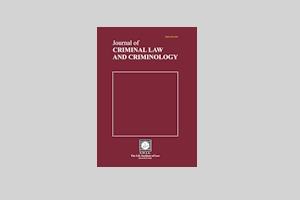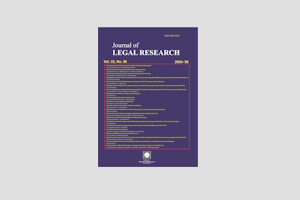Journal of
LEGAL RESEARCH
Number 29
Vol. XV ● No. 1
Spring – Summer 2016
Managing Editor: Vahid Eshtiagh
Editor-in-Chief: Seyyed Ghasem Zamani
CONTENTS
Articles
Transmission of AIDS Virus and Commit of Generic Deadly Action
Alireza Emamdadi & Ebrahim Taghizade & Mohammad-Ali Taheri
Principle of Legitimacy, Sovereignty and Transformation of Traditional Structure of International Law
Hossein Sartipi
Development and Transfer of Marine Technology in Viewpoint of International Law of Technology Development and Transfer in Theory and Practice
Akbar Adibi
Developing Countries and WTO Disputes Settlement Mechanisms
Sepideh Zebardast
Comparative Study of Broad and Narrow Interpretation of Contra Proferentem Rule in Insurance Contracts
Alireza Yazdanian & Hamid Araei
An Inquiry on the Possibility of Crime against Joint Tenancy by Partner
Mohammad Bagheri Komar Olia & Naser Nosrati Sadaghiani
World Bank Effort to Maintain International Peace and Security
Malihe Behfar
No Fly Zone in International Law with Respect to Security Council Practice
Aghil Mohammadi
Articles
Transmission of AIDS Virus and Commit of Generic Deadly Action
Alireza Emamdadi
MA in Criminal Law and Criminology and member of academic Payamnoor University south Khorasan,
&
Ebrahim Taghizade
Guide professor and member of academic staff, Email: taghizaadh@gmail.com
&
Mohammad-Ali Taheri
Guide professor and member of academic staff
Abstract:
Spread of AIDS illness in recent years and impossibility of cure for it, causes the infection and transmission of this illness; can be a doer for damage the people and commitment of crime. If the death occurs because of transmission can persuade as a homicide.
On the other hand, the 290th section of Islamic punishment law1392 says that one of the kinds of doing a murder, occurs when a killer do a generic deadly action without the purpose of killing him.
So, thinking that this homicide is intent due to typicality of the perpetration action and situations that a legislator considers for the meaning of a generic deadly action. Because of this, transmission of HIV virus whenever cause the death of victim, can count as a generic deadly action in some situations.
Keywords: AIDS, criminal, murder, a generic deadly action, intention of homicide.
Principle of Legitimacy, Sovereignty and Transformation of Traditional Structure of International Law
Hossein Sartipi
Abstract:
Legitimacy, intrinsic value, but always challenging, is ambiguous. Precise definition of the concept and its extent cannot be easily achieved and the area is also full of ambiguity. Moreover, what is the importance of passion, how it is because it must be applied in such a way so as not to challenge state authority. Some governments in the past two decades, with the pretext of legitimacy of governments around the place, which involved the promotion of human rights is not necessarily the result. It is true that in the current international law, a person of high status enjoyed is and significant administrative and legal mechanisms designed to improve the human rights situation and adopted and Legitimacy purely is not considered as a domestic, but also it has an international aspect. No one can say that the border incidents not related to others. It must be said that the sovereignty as one of the fundamental principles of international law recognized. It is true that the traditional framework of international law is now being seriously challenged, but sovereignty is also the important. Of course, new various fields of international law, including human rights, legitimacy and so on, has limited and provided conditional sovereignty.
Keywords: Legitimacy, Government, Sovereignty, Human Rights
Development and Transfer of Marine Technology in Viewpoint of International Law of Technology Development and Transfer in Theory and Practice
Akbar Adibi
Ph.D. candidate in International Law from Islamic Azad University,
Tehran science and research campus and faculty member of Payame Noor University of Tehran, Baharestan campus
Abstract:
Emergence and manifestation of the concept of common human heritage in international society and international law in recent decades and interesting from it, along with the required technology and its development and transfer for this purpose, has a deep and inseparable connection; rules, regulations and procedures governing on marine technology development and transfer is effected from international law governing on technology development and transfer in general. On the other hand, as there are various national and international obstacles and innovation in advanced and complicated of marine technology and its development and transfer in procedure and international law, and lack of binding basis and rules and frameworks in theory and practice in this regard, growth and development and realize of this issue requires wide and global cooperation especially from the developed countries and the holder of requisite technology and creation and formation of binding engagements of legal and customary in this way.
Keywords: common human heritage, development and transfer of technology.
Developing Countries and WTO Disputes Settlement Mechanisms
Sepideh Zebardast
Ph.D. Student of Public International Law in Islamic Azad University, South Tehran Branch
Abstract:
Developing countries which constitute the majority members of the World Trade Organization (WTO) are having a better situation relative to the past. On the other hand, their economic deficiency and inexperience in international trade, is a disadvantage for them with regard to developed countries. This is clearly seen in trade disputes and judicial cases in the world trade organization. The process considered for resolving trade disputes in WTO does not benefit developing countries due to its high costs and complexity. Thus, making them to cooperate is important for the legitimacy of the world trade system and, for this end, three major solutions including institutional reforms, process reforms, and systemic reforms are discussed.
Keywords: WTO, Developing Countries, Legitimacy, Disputes, Inequality Compensative
Comparative Study of Broad and Narrow Interpretation of Contra Proferentem Rule in Insurance Contracts
Alireza Yazdanian
Ph.D., Law Department, University of Isfahan
&
Hamid Araei
LLM Student, Law Department, University of Isfahan
Abstract:
Based interpretation of a contract is the analyzing common intention of both sides. To reach and clarify such a deed, the application of interpretation rules is essential. one of the contract that is required in their interpretation are adhesion contracts such as insurance contract that in which most happen many contradictions in expressions and conditions and this might highlight the importance of the application of interpretational rules in these kinds of contracts. One of the most outstanding rules known as Contra Proferentem rule, which is current in contract interpretations, is interpretation to the loss of contract binders. It is attempted to consider this rule and its outcomes resulted by its execution as well as its advantages and disadvantages in two ways of broad and narrow interpretations. The main emphasis is on the American jurisprudence as a country that have common law system and particularly in insurance contract. Appears with little perspective, we could to apply that the rules with consideration in terms of interpretation of Iran’s legal system.
Keywords: ambiguity of contract, interpretation, insurance contract, broad rule, narrow rule.
An Inquiry on the Possibility of Crime against Joint Tenancy by Partner
Mohammad Bagheri Komar Olia
Ph.D. Student Penal and Criminology
&
Naser Nosrati Sadaghiani
Master of Private Law
Abstract:
In this paper the probability of the commission of offence while using a shared property will be discussed. Diverse ideas and opinions have been presented concerning this issue which can be divided into two groups, in favor and against the issue, indicating the significance of it. There are those who believe that because the property which is the subject of the offence belongs to someone else and offender is not the sole owner, no offence has been committed. Moreover they believe that the offender has the ownership right in every part of the shared property and the property cannot be referred to as the property of others. Consequently, there is no probability of the commission of offence. On the other hand, there are those who believe that it is likely to prove the commission of offence by using a shared property because the partner is able to benefit or suffer from the property. To this effect, the writer of this paper has concluded that the commission of offence is likely by using a shared property. However, due to the principle of legality of crime and punishment and abridge interpretation in favor of the accused person, the judge shall not be allowed to inflict penalty upon the offender of the offence committed by using a shared property other than serious theft and destruction.
Keywords: partner, join tenancy, crime, theft, legality.
World Bank Effort to Maintain International Peace and Security
Malihe Behfar
Candidate for Ph.D. degree in Public International Law, Science and Research branch,
Islamic Azad University, Tehran, Iran
Abstract:
The programs of international peace and security require global arrangement. It is widely accepted that social and economic issues will impact on international peace and security. World Bank efforts to achieve target of helping developing countries and poverty reduction. The high level of poverty in the world is not only morally unacceptable but it increase threat to international security. Peacekeeping has two phases. One of them is before the outbreak of hostilities and attempts to prevent breach of the peace and security. the second is after the outbreak of hostilities in conflict rebuilding efforts and prevent to return to before situation. World Bank confers easy loans with lower interest also offering technical assistance to countries in cooperation with united nation organs .different subjects such as political, economical, environmental topic are affected on international security so achieving this end need international cooperation.
Keywords: international peace and security, World Bank, poverty reduction, developing, peace building commission, peace building fund.
No-Fly Zone in International Law with Respect to Security Council Practice
Aghil Mohammadi
Abstract:
In contemporary International Law, known as one of the most important protective mechanisms, no-fly zone, in both international and non-international armed conflicts. With the rising importance of human rights in the domestic and international law, the international community calls for quicker and more crucial response of international institutions, particularly the UN Security Council, in the serious and egregious violations of the law . Establishing no-fly zones must be considered in order to fulfillment above mentioned matter, and maintaining international peace and security and respect to human rights and humanitarian international law are important two measures to recognition and analysis the legal system governing on these zones. Iraq, the former Yugoslavia and Libya are among the most important examples of the creation of such areas. However establishing a no fly zone in Iraq had any explicit grounds in Security Council resolutions, but establishing a no fly zone above territories of the former Yugoslavia and Libya must be based on Security Council resolutions. Considering legal basis of establishing no fly zones and the extent of the success and efficiency of this measure in protecting civilians are the issues that are considered in this article.
Keywords: fly zone, humanitarian intervention, Iraq, the former Yugoslavia, Libya.





